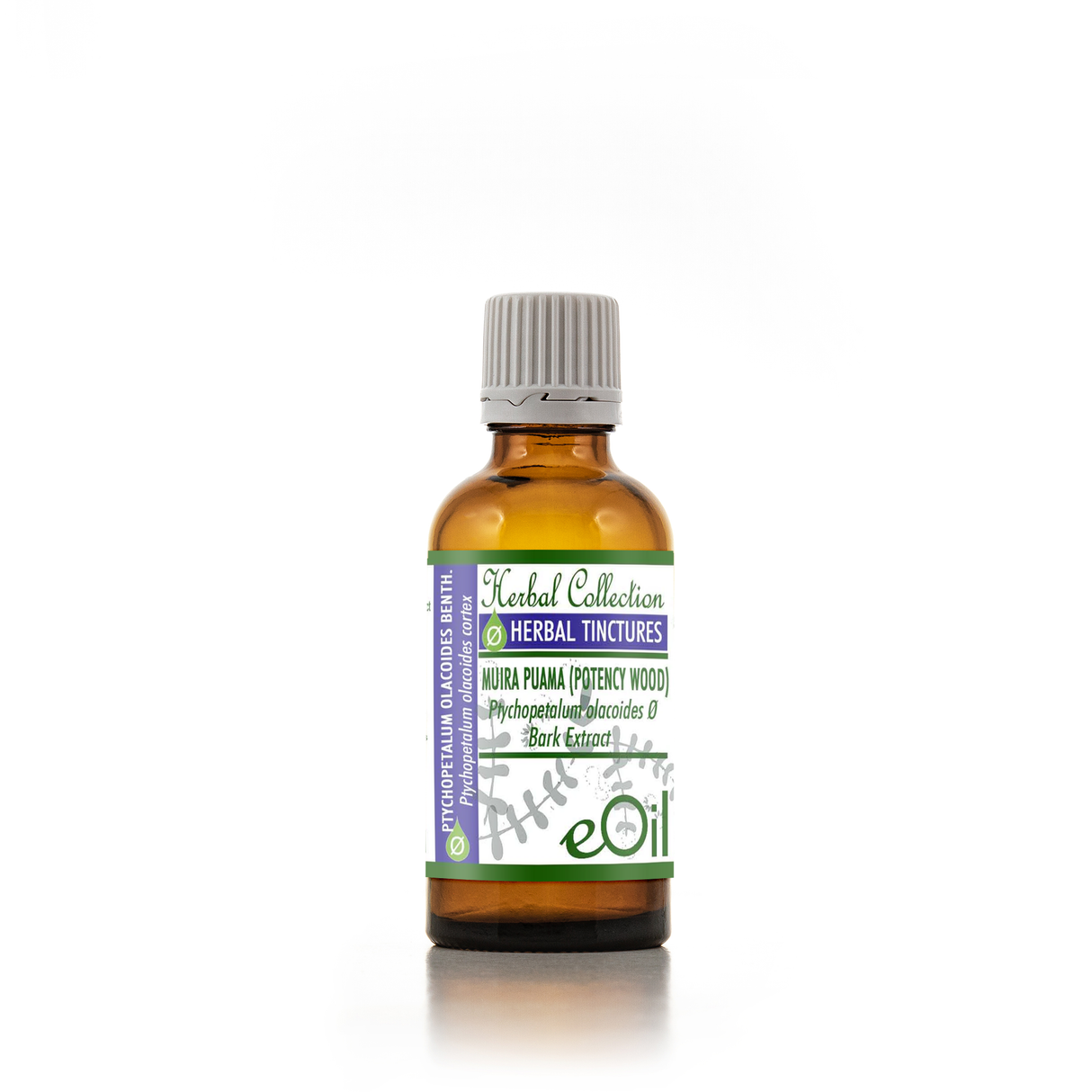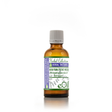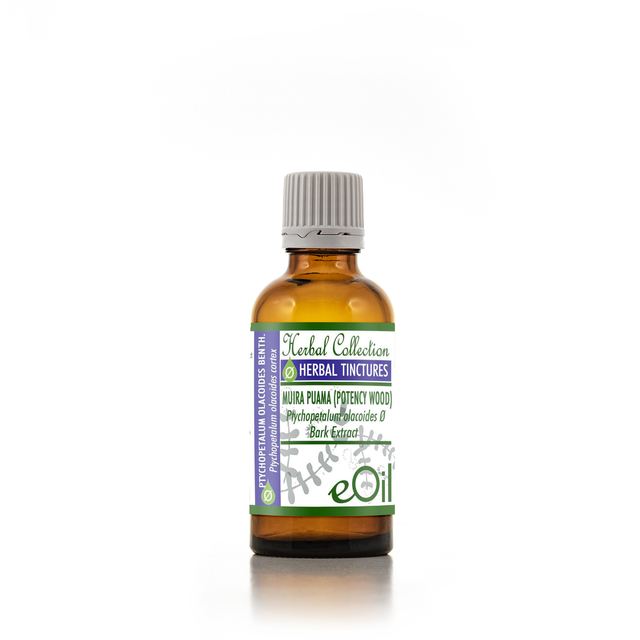Muira puama - Liquid Herbal Extract
Muira puama - Liquid Herbal Extract - 50 ML is backordered and will ship as soon as it is back in stock.
Description
Description
Understanding Mother Tinctures & Glycerines
Muira puama (Ptychopetalum olacoides) ( Potency wood ) liquid herbal extract tincture is a plant-based supplement traditionally valued for supporting sexual wellness, vitality, and cognitive function.
Known as "potency wood," it is additive-free, and may assist natural energy and mental clarity as part of daily wellness routines
TRADITIONALLY USED FOR
Uses of Muira Puama Tincture
Muira puama tincture, derived from the roots and stems of the Ptychopetalum olacoides tree native to the Amazon, is traditionally and popularly used for several purposes:
1. Sexual Health and Libido
- Muira puama is most renowned as a natural aphrodisiac. It is often referred to as the "Viagra of the Amazon" due to its traditional use in enhancing libido and sexual desire in both men and women.
- It is used to address sexual disorders, including impotence (erectile dysfunction) and loss of sexual desire, and is considered helpful for female frigidity.
- Some formulations are marketed specifically to increase interest in sexual activity and improve erectile function.
2. Energy and Adaptogen
- The tincture is sometimes used as a general tonic to boost energy, reduce fatigue, and help the body cope with stress (adaptogenic effect).
- It is also considered beneficial for improving mood and promoting hormonal balance.
3. Cognitive Function and Nervous System
- Muira puama is used as a nerve tonic and is believed to stimulate the nervous system, potentially improving memory, focus, and mental clarity.
- Some studies in animals suggest it may have neuroprotective and anti-amnesic properties, with potential applications for cognitive decline and conditions like Alzheimer’s disease8.
4. Menstrual and Neuromuscular Disorders
- The tincture is used in traditional and homeopathic medicine for menstrual complaints, such as cramps, heavy bleeding, and irregular cycles.
It is also used as a tonic for neuromuscular disorders and to support nervous system energy.
5. Other Traditional Uses
- Muira puama has been used for joint pain, rheumatism, digestive issues (such as indigestion, constipation, and diarrhea), and as a remedy for nerve pain and inflammation.
- Some sources mention its use for cardiovascular health and as an anti-aging supplement due to its antioxidant properties.
Scientific Evidence and Safety
- While muira puama has a long history of traditional use, scientific evidence supporting these uses is limited and largely based on anecdotal reports and animal studies138.
- It is generally considered possibly safe when taken by mouth in moderate doses for up to one month, but safety for long-term use and in pregnancy or breastfeeding is not established1.
Summary Table: Main Uses of Muira Puama Tincture
| Use Category | Description |
|---|---|
| Sexual Health | Enhances libido, treats impotence, supports sexual function in men and women |
| Energy & Adaptogen | Boosts energy, reduces fatigue, helps cope with stress |
| Cognitive Function | May improve memory, focus, and mental clarity; potential neuroprotective effects |
| Menstrual/Neuromuscular | Used for menstrual complaints and as a nerve tonic |
| Other Traditional Uses | Joint pain, digestive issues, nerve pain, cardiovascular health, anti-aging |
Conclusion
Muira puama tincture is primarily used as a natural remedy for sexual health, energy, stress, cognitive support, and menstrual or neuromuscular complaints. Most of these uses are based on traditional practices, and robust scientific evidence is lacking. Consultation with a healthcare provider is recommended before use, especially for individuals with underlying health conditions or those taking other medications
INFORMATION
Source : https://www.wikiphyto.org/wiki/Muira_puama
Reference on http://www.wikiphyto.org
Translation in English by Google Translate (go to the page of the source linked | on Chrome cellphones go on the 3 dots on the top right and select translate in your preferred language | on laptop right click your mouse and select option translate when hoovering on the page
Muira puama
Summary
- 1Plant Name
- 2International Latin denomination
- 3Botanical family
- 4Description and habitat
- 5History and tradition
- 6Parts used
- 7Dosage forms available
- 8Usual dosages
- 9Composition
- 10Properties
- 11Indications
- 12Known or suspected mode of action
- 13Usual formulations
- 14Regulation
- 15Possible side effects and precautions for use
- 16Bibliographic references
Plant Name
Muira puama, Marapuama
International Latin denomination
Ptychopetalum olacoides Benth., Liriosma ovata Miers., Ptychopetalum unicatum
Botanical family
Oleaceae ( Olacaceae ?)
Description and habitat
- Plant aphrodisiac appreciated in Brazil like Ptychopetalum olacoides Benth. Olacaceae (bark)
- Shrub native to the Brazilian Amazon that can reach five meters high
History and tradition
- Used for a long time by the Amazonian Indians to treat impotence, neuromuscular problems, rheumatism, flu
- Also used as a nervous tonic and aphrodisiac
- One of the ingredients of a traditional Brazilian tonic called catuama which also contains guarana , ginger and Trichilia catigua [1] , also used as a sexual stimulant, relaxing the corpus cavernosum of the rabbit [2] , and which prevents ventricular fibrillation of the isolated rabbit heart [3]
Parts used
- Bark of the shrub or root
Dosage forms available
- Maceration of dry plant in rum or decoction in water (1 tablespoon for 500 ml)
- Mother tincture of wood and root
- Powder 1500 mg
Usual dosages
Composition
Main components of the plant
Main components of buds or young shoots
Main components of essential oil
Properties
Properties of the plant
- Aphrodisiac (according to K. Hostettmann, a clinical study in male impotence gave 52% good results)
- Alcoholic extracts would be more effective
- Came to Europe during the 1920s and 1930s and is still believed to be part of the British Herbal Pharmacopoeia for the treatment of dysentery and impotence. It has been part of the Brazilian pharmacopoeia since the 1950s
- The popularity of Viagra® has brought muira puama back into the spotlight, as have other plants known to be aphrodisiacs. It is part of several combinations of plants whose virtues are touted with great enthusiasm by the companies that market these products.
- Incomplete clinical study conducted by French sexologist Jacques Waynberg
- Improves memory, through multiple mechanisms and action on serotonin 5HT (2A) receptors [5]
- Anticholinergic, potential in Alzheimer's disease [6] , [7] , neuroprotective [8] , [9] , [10] , [11]
- Antidepressant potential [12] , [13]
Properties of the bud
Properties of essential oil
Indications
Indications for the whole plant (phytotherapy)
- Male impotence
- Female frigidity, dysmenorrhea and premenstrual syndrome
Bud indications (gemmotherapy)
Specific indications for essential oil (aromatherapy)
Known or suspected mode of action
Usual formulations
Regulation
Possible side effects and precautions for use
- Contraindicated for pregnant and breastfeeding women
Bibliographic references
- ↑ Oliveira CH, Moraes ME, Moraes MO, Bezerra FA, Abib E, De Nucci G. Clinical toxicology study of an herbal medicinal extract of Paullinia cupana, Trichilia catigua, Ptychopetalum olacoides and Zingiber officinale (Catuama) in healthy volunteers. Phytother Res. 2005 Jan;19(1):54-7. PMID 15798997
- ↑ Antunes E, Gordo WM, de Oliveira JF, Teixeira CE, Hyslop S, De Nucci G. The relaxation of isolated rabbit corpus cavernosum by the herbal medicine Catuama and its constituents. Phytother Res. 2001 Aug;15(5):416-21. PMID 11507734
- ↑ Pontieri V, Neto AS, de França Camargo AF, Koike MK, Velasco IT. The herbal drug Catuama reverts and prevents ventricular fibrillation in the isolated rabbit heart. J Electrocardiol. 2007 Nov-Dec;40(6):534.e1-8. PMID 17888942
- ↑ Tang W, Harada K, Kubo M, Hioki H, Fukuyama Y. Eight new clerodane diterpenoids from the bark of Ptychopetalum olacoides. Nat Prod Commun. 2011 Mar;6(3):327-32. PMID 21485268
- ↑ da Silva AL, Ferreira JG, da Silva Martins B, Oliveira S, Mai N, Nunes DS, Elisabetsky E. Serotonin receptors contribute to the promnesic effects of P. olacoides (Marapuama). Physiol Behav. 2008 Sep 3;95(1-2):88-92. doi: 10.1016/j.physbeh.2008.04.022. PMID 18561960
- ↑ Siqueira IR, Fochesatto C, da Silva AL, Nunes DS, Battastini AM, Netto CA, Elisabetsky E. Ptychopetalum olacoides, a traditional Amazonian "nerve tonic", possesses anticholinesterase activity. Pharmacol Biochem Behav. 2003 Jun;75(3):645-50. PMID 12895682
- ↑ Figueiró M, Ilha J, Pochmann D, Porciúncula LO, Xavier LL, Achaval M, Nunes DS, Elisabetsky E. Acetylcholinesterase inhibition in cognition-relevant brain areas of mice treated with a nootropic Amazonian herbal (Marapuama). Phytomedicine. 2010 Oct;17(12):956-62. doi: 10.1016/j.phymed.2010.03.009. PMID 20833520
- ↑ Siqueira IR, Cimarosti H, Fochesatto C, Nunes DS, Salbego C, Elisabetsky E, Netto CA. Neuroprotective effects of Ptychopetalum olacoides Bentham (Olacaceae) on oxygen and glucose deprivation induced damage in rat hippocampal slices. Life Sci. 2004 Aug 27;75(15):1897-906. PMID 15302233
- ↑ IR Siqueira, DR Lara, D. Silva, FS Gaieski, DS Nunes, E. Elisabetsky. Psychopharmacological Properties of Ptychopetalum Olacoides bentham (Olacaceae). Pharmaceutical Biology, 1998, Vol. 36, No. 5, Pages 327-334
- ↑ Figueiró M, Ilha J, Linck VM, Herrmann AP, Nardin P, Menezes CB, Achaval M, Gonçalves CA, Porciúncula LO, Nunes DS, Elisabetsky E. The Amazonian herbal Marapuama attenuates cognitive impairment and neuroglial degeneration in a mouse Alzheimer model. Phytomedicine. 2011 Feb 15;18(4):327-33. doi: 10.1016/j.phymed.2010.07.013. PMID 20739160
- ↑ Siqueira IR; Fochesatto C; Torres ILS; da Silva AL; Nunes DS; Elisabetsky E; Netto C A. Antioxidant activities of Ptychopetalum olacoides ("muirapuama") in mice brain. Phytomedicine: international journal of phytotherapy and phytopharmacology 2007;14(11):763-9.
- ↑ Piato Angelo L; Detanico Bernardo C; Jesus Jennifer F; Lhullier Francisco Luiz Rodrigues; Nunes Domingos S; Elisabetsky Elaine. Effects of Marapuama in the chronic mild stress model: further indication of antidepressant properties. Journal of ethnopharmacology 2008;118(2):300-4.
- ↑ Piato AL, Rizon LP, Martins BS, Nunes DS, Elisabetsky E. Antidepressant profile of Ptychopetalum olacoides Bentham (Marapuama) in mice. Phytother Res. 2009 Apr;23(4):519-24. doi:10.1002/ptr.2664. PMID 19067380
- health passport [1]
CAUTION
Do not use during the first 3 months of pregnancy / breastfeeding
Keep out of reach of children and pets.
As a general rule, always perform a skin patch test before using your essential oils for the first time.
Due to the natural origin of our products, some ingredients may contain trace proteins or allergens, especially in unrefined oils.
We strongly recommend performing a patch test on a small skin area 48 hours before full use to check for sensitivities.
Always dilute essential oils appropriately and follow our recommended usage guidelines to ensure safe application.
If you experience any irritation or allergic reaction, discontinue use immediately and consult a healthcare professional
For more detailed information, please go check this LINK TO Instructions of use essential oils page
DO NOT USE UNDILUTED and SEEK MEDICAL AND SPECIALIST ADVISE WHEN IN DOUBT.
SEE OUR PAGE ON PRECAUTION - HOW TO USE ESSENTIAL OILS SAFELY



